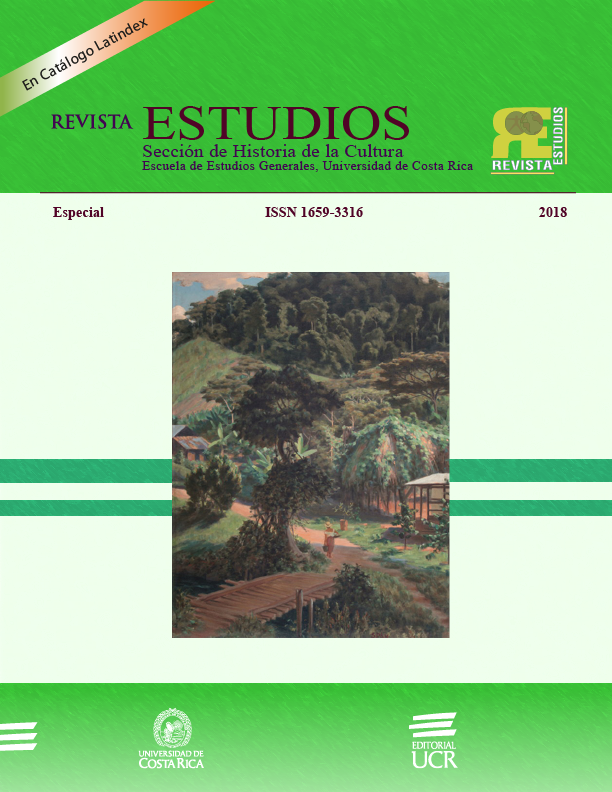Abstract
The ecofeminist approach explores a link between an idyllic nature of the western philosophical aesthetic and an aggressive nature inherent in its apocalyptic and monstrous side. This approach serves as a bridge between two competing forces to model and negotiate the potentiality represented by political ecology and the quest for social justice. This study examines the costs of aggression, domination and competition by reclaiming a story from Mexican history and reformulating it in the alternative narrative, The Isle of Passion, written by Colombian novelist Laura Restrepo. The novel discovers both the power of nature and women to dismantle social and natural hierarchies and recreate more open systems relying, in their place, on their inherent values. This transformation is ironically achieved on an almost deserted island, which was ignored by the Mexican government but desired by numerous multinational powers since the beginning of the twentieth century. It is here in this microcosm of society where the two worlds of savage and idyllic nature collide to yield a figure of nature as partner and collaborator that aides in the battle against the decaying of the earth and human moral life.References
André, María Claudia. “Deseo, represión y locura en Delirio de Laura Restrepo.” Juana Alcira Arancibia, editor. La mujer en la literatura del mundo hispánico. Buenos Aires: Instituto literario y cultural hispánico, 2005: 255-270.
Averis, Kate. “Laura Restrepo.” Will H. Corral, Juan E. De Castro, Nicholas Birns. The Contemporary Spanish-American Novel: Boloño and After. New York: Bloomsbury Academic 2013.
Ashcroft, Bill, Gareth Griffiths y Helen Tiffin. The Empire Writes Back. Theory and Practice in Post-colonial Literatures. London: Routledge, 2003.
Buell, Lawrence. Writing for an Endangered World. Literature, Culture, and Environment in the U.S. and Beyond. Belknap Press, Harvard UP, Cambridge, MA, 2001.
Campbell, Andrea, editora. New Directions in Ecofeminist Literary Criticism. Newcastle, UK: Cambridge Scholars Publishing, 2008.
Carreño Pedraza, Elisa Alejandra. “La isla de la pasión de Laura Restrepo” Revista de Literatura Contemporánea Mexicana 14, 2007: 123-124.
DeVries, Scott. A History of Ecology and Environmentalism in Spanish American Literature. Lewisburg, PA: Bucknell UP, 2013.
Gaard, Greta y Patrick D. Murphy, editores. Ecofeminist Literary Criticism: Theory, Interpretation, Pedagogy. Chicago: University of Illinois Press, 1998.
Gebara, Ivone. “Ivone Gebara: Jerarquía de la iglesia, obstáculo para el empoderamiento femenino.” http://www.webislam.com/articulos/37256-ivone_gebara-jerarquia.
Hughes Davis, Lloyd. “Laura Restrepo.” Lloyd Hughes Davis y Brígida Pastor, editors. A Companion to Latin American Women Writers, 2012: 197-211.
Melis, Daniela. “Una entrevista con Laura Restrepo” Chasqui 34 (1) 2005: 114-129.
---. “Creation and (Re)presentation of Historical Discourse in Isle of Passion by Laura Restrepo.” Studies in 20th & 21st Century Literature, Vol. 35, 2011: 250-267.
Merchant, Carolyn. The Death of Nature. Women, Ecology and the Scientific Revolution. New York: Harper Collins, 1983.
Mignolo, Walter D. Local Histories/Global Designs. Coloniality, Subaltern Knowledges, and Border Thinking. Princeton: Princeton UP, 2000.
Osorio, José Jesús. “Relaciones ambiguas: periodismo y literature en La isla de la pasión.” Elvira Sánchez-Blake y Julie Lirot, editoras. El universo literario de Laura Restrepo. Bogotá: Taurus/Alfaguara, 2007: 93-108.
Puleo, Alicia. “Existe un ecofeminismo para la igualdad en el futuro modelo de desarrollo.” http://www.mujeresenred.net/spip.php?article1249.
Restrepo, Laura. La Isla de la Pasión. New York: Rayo/Harper Collins, 2005. ---. con Jaime Manrique, “Entrevista con Laura Restrepo.”
Elvira Sánchez-Blake y Julie Lirot, editoras. El universo literario de Laura Restrepo. Bogotá: Taurus/Alfaguara, 2007: 353-367.
Sánchez-Blake, Elvira y Julie Lirot, editoras. El universo literario de Laura Restrepo. Bogotá: Taurus/Alfaguara, 2007.
Warren, Karen J. “A Feminist Philosophical Perspective on Ecofeminist Spiritualities.” Carol J. Adams, editora. Ecofeminism and the Sacred. New York: Continuum, 1993.
---. Ecofeminist Philosophy. A Western Perspective on What It Is and Why It Matters. New York: Rowman & Littlefield, 2000.
Williams, Raymond L. “Nature in the Twentieth-Century Latin American Novel (1900–1967) and in Cien años de soledad of García Márquez.” Adrian Taylor Kane, editor. The Natural World in Latin American Literatures: Ecocritical Essays on Twentieth Century Writings. Jefferson, NC: MacFarland & Co. Publishers, 2010: 66-88.


